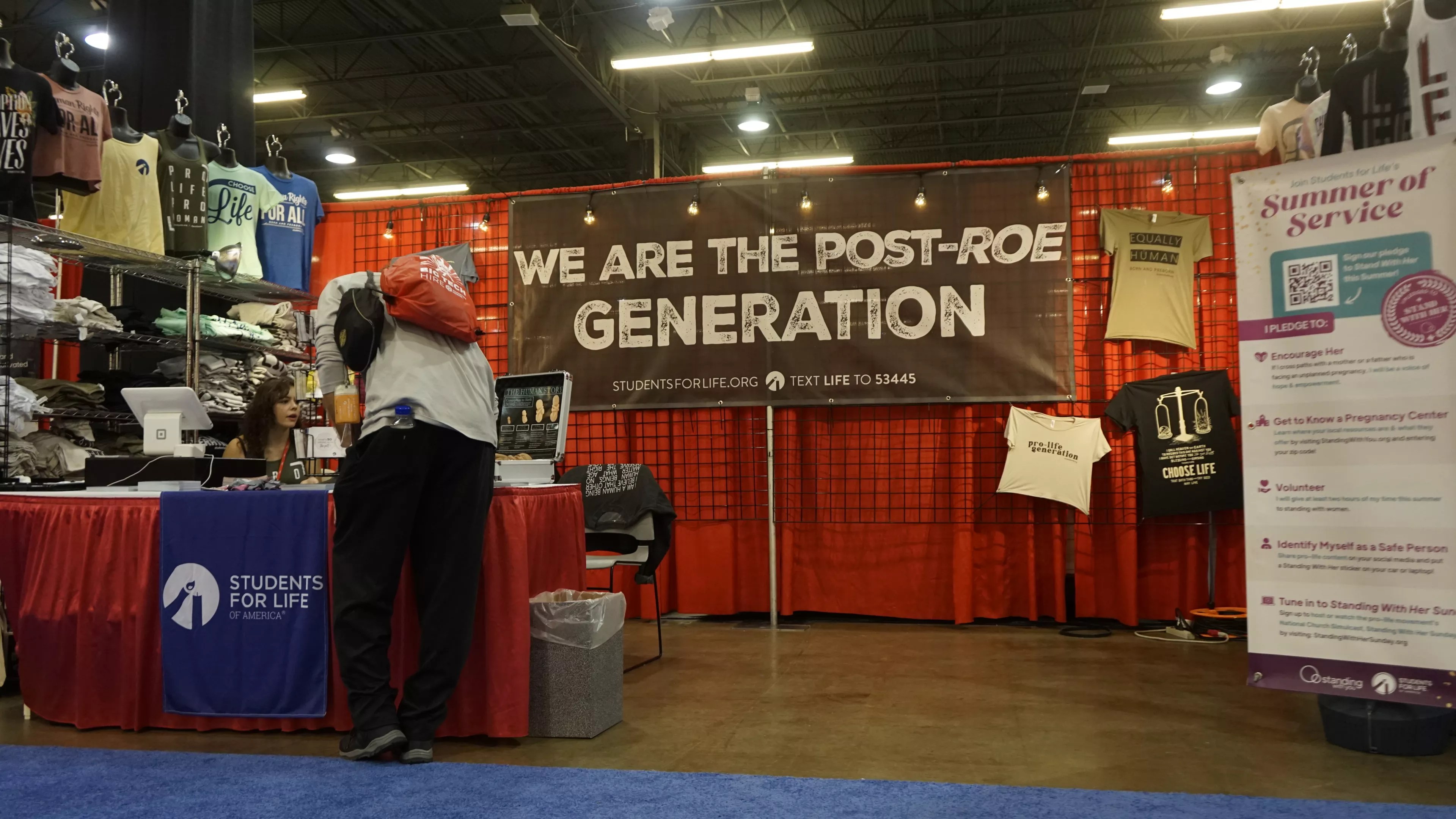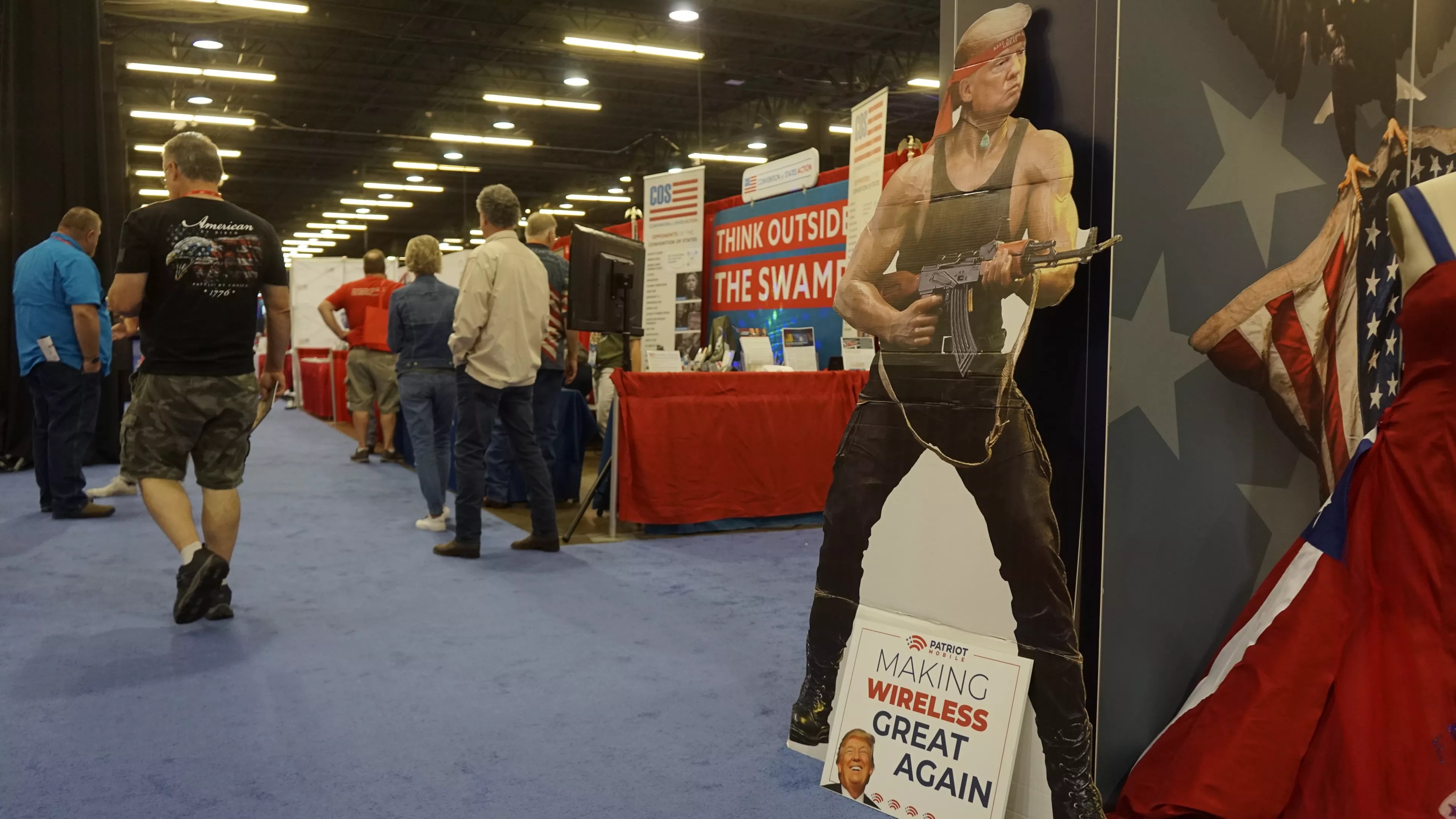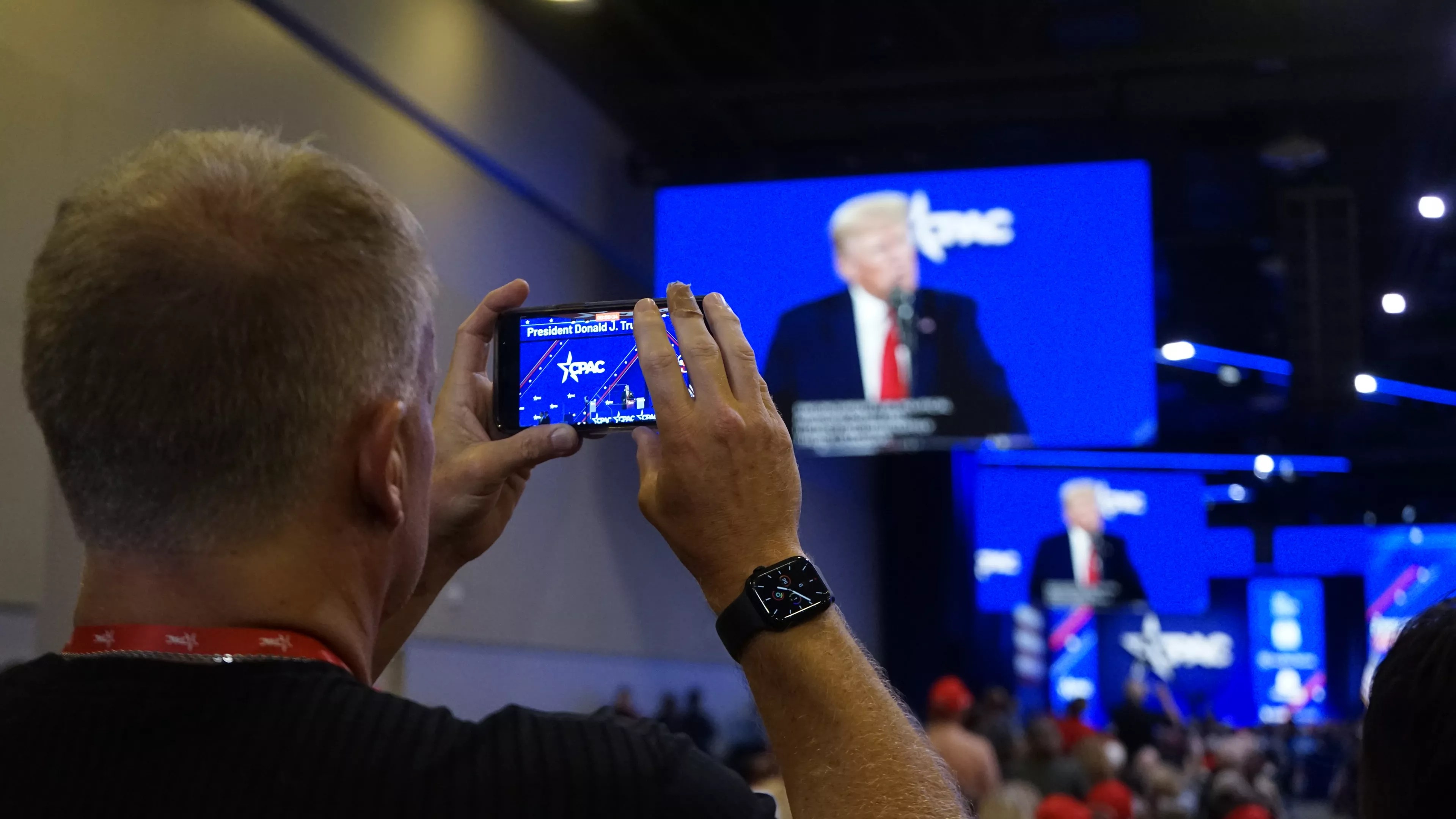
Patrick Strickland

Audio By Carbonatix
Entering the Conservative Political Action Conference’s event at the Hilton Anatole hotel in Dallas, you’ll walk past one sign after another mentioning the word “freedom.” You’ll pass right-wing booths – “Read Epoch Times, Defeat Communism,” says a poster at the ultra-conservative newspaper’s table. You’ll pass vendors hawking QAnon ball caps and shirts emblazoned with President Joe Biden’s face with a Hitler-like mustache atop his lip. You’ll ask where the press section is, and a volunteer will point to a cordoned area in the back of the main ballroom. That’s “your cage,” she’ll tell you.
CPAC first came to town in 2021, not long after another rightwing conference, the QAnon-linked “For God & Country Patriot Roundup.” Like the 2021 gathering, this year’s event included conservative speakers from across the country and beyond. Former President Donald Trump came again. U.S. Sen. Ted Cruz made another appearance. Hungary’s far-right prime minister, Viktor Orbán, even took a break from demonizing refugees and migrants in his country and made the 5,600-mile trip to demonize refugees and migrants in Dallas. To hear CPAC organizers tell it, they picked Dallas because it’s in Texas, a state they apparently view as one of the last bastions of freedom in a country beleaguered by progressives.
To Cal Jillson, a professor at Southern Methodist University and an expert on Texas politics, CPAC’s decision to hold its conference in Dallas a second year in a row is “unusual.” Still, he said, “They find Texas to be particularly comfortable, ideologically and in partisan terms. It’s the largest American red state.”
When the day’s events kicked off early Thursday afternoon, a rabbi who’d traveled from Israel led a bizarre prayer in which he asked God to rid us of “Biblical illiteracy,” “Godlessness” and “moral relativism.” The attendees stood with their hands folded across their paunches, their heads bowed in prayer. He warned of “the haughty forces of darkness who wish to enslave us with their manufactured fears and experimental morality.” Behind the rabbi, a giant video screen read in bright letters, “Awake, Not Woke.”
Singer Natasha Owens then took the stage. Wearing a large red, white and blue dress that read “Mobilizing Patriotism,” an ad for a Christian mobile telephone company, she launched into her set. The highlight was a track titled “America First,” words she claimed had led to Trump’s “crucifixion.”
When Owens wrapped up, the room darkened, and a trailer for a CPAC film titled The Culture Killers: The Woke Wars appeared on the screens. At a dizzying pace, the trailer flashed between clips of protests turned rowdy, American flags aflame, Confederate statues being toppled, Republican politicians lamenting the supposed Marxist threat and at one point, a brief clip of an elderly Fidel Castro. “The land of the free under siege from an enemy within,” an ominous voice narrates over images of Black Lives Matter rallies.
After the prayer, the national anthem, the pledge of allegiance, Owens’ performance and the movie trailer, first up on the mainstage was Texas Gov. Greg Abbott. He spoke on a panel with CPAC chairman Matt Schlapp and his wife, Mercedes. On the screen behind them was this year’s theme: “Fire Pelosi. Save America.” Abbott, who will face off with Democratic challenger Beto O’Rourke in November, ticked off a list of campaign talking points: migration constitutes an “invasion,” property taxes need to be cut, parents ought to control what their children are taught in schools.
That day, Abbott was still neck deep in a public squabble with California Gov. Gavin Newsom and D.C. Mayor Muriel Bowser. Newsom had recently taken out ads blasting Abbott in Texas papers. Bowser had criticized him for busing migrants to D.C.
“You know, the mayor of Washington has really picked a beef with you over the fact that there’s an invasion going on in Washington, D.C., because you sent 5,000 illegals,” the CPAC chairman told Abbott.
Abbott said he’d visited South Texas and found that local officials said their communities were “completely overrun” with migrants. The officials wanted Border Patrol to bus asylum seekers to San Antonio, he claimed. “I said, ‘Don’t do that. We’re going to bus them all the way to Washington, D.C.'”
The Republican governor added, “I’ve got one thing to tell you and to tell them: There are more buses on the way as we gather at this conference today.” He then asked attendees to donate money to help pay for buses to the U.S. capital. (The next morning, Abbott went on Twitter to announce that he’d sent more buses headed northeast, including to New York City.)
Human rights organizations, civil rights groups and Democrats have warned that Abbott’s xenophobic rhetoric and border stunts could fuel further violence against migrants and asylum seekers. After all, the word “invasion,” which Abbott’s used with increasing frequency the closer midterms get, echoes the manifesto published by Patrick Crusius, who shot and killed 23 people at an El Paso Walmart in August 2019. But at CPAC, that kind of rhetoric just earns him applause.
Matt Angle, director of the Lone Star Project, a group that backs Democratic candidates in Texas, says Abbott’s stunts are “all directed at the most extreme, divisive and mean-spirited elements within his own party.
“I think that during this entire campaign, Texas has been in [Abbott’s] rearview mirror,” he said. “He shows up at CPAC, within a crowd where he’s never going to be pressed on anything, but refuses to show up at a single town hall meeting during his entire governorship.”

Attendees wore red foam hats that said, “Fire Pelosi, Save America.”
Patrick Strickland
Angle said Abbott’s rhetoric constituted “barely camouflaged hate speech,” adding: “It’s the same type of rhetoric that, if it was posted on Facebook by an 18-, 19- or 20-year-old, we’d be alarmed about what they would do.”
When Abbott’s panel concluded, Hungary’s far-right leader took the stage. Fresh from controversy over comments he made last month warning that migration would turn Hungarians into a “mixed race,” Orbán delivered a bizarre string of clichés that you’d be forgiven for mistaking as a middle school coach’s pregame pep talk. Conservatives needed to “fight to win” and “play by [their] own rules,” he said, adding that “yesterday’s homeruns don’t win today’s games.”
But between the platitudes, he got to the meat of why American Republicans wanted him there. He’d spent more than a decade dismantling Hungarian civil society, tightening his government’s grasp on the press, railing against Hungarian American billionaire and philanthropist George Soros and casting migration as an existential threat to “Western civilization.”
Evoking language that might ring uncomfortably familiar to Texans, Orbán boasted, “Ladies and gentlemen, we were the first ones in Europe who said no to illegal migration and stopped the invasion of illegal migrants.” Hungary had built a wall during the 2015 refugee crisis in Europe, and now he insisted that’s why the country was waging a war against the supposedly progressive world order. “The globalists can all go to hell,” he said toward the end. “I have come to Texas.”
**
At the first CPAC conference in January 1974, then California Gov. Ronald Reagan delivered the inaugural speech to some 400 attendees. At the time, Republican President Richard Nixon was wading through controversy over the Watergate scandal, revelations that his administration had been linked to a break-in at Democratic National Committee’s headquarters two years earlier and had tried to cover it up. The Watergate burglars had ostensibly intended to bug the Democratic National Committee and photograph campaign documents. (Some eights months later, Nixon would resign. Eventually, 69 people were indicted over crimes stemming from the scandal, 48 of whom were convicted.)
Throughout the conference that year, participants expressed concern about whether Nixon could lead to the party’s demise at the polls. “Why should we go down with the ship?” one asked, The Associated Press reported. Howard Phillips, the Office of Economic Opportunity’s former acting director, warned that there was a “very great danger of people identifying the conservative movement with Nixon.”
Many conference speakers skirted those concerns, and Reagan ignored them altogether. Ray Humphreys, a Washington campaign consultant, suggested that attendees tell anyone who pressed them on Nixon, “Hell, I wasn’t within 500 miles of Watergate.”
If a Republican president’s supporters’ attempting to undermine the opposing party at the expense of democracy sounds like a familiar scenario, that’s because it is. Five decades after that burglary, CPAC Dallas comes amid increasingly worrisome revelations about Trump’s actions during the U.S. Capitol riot on Jan. 6, 2021.
In June, former Trump White House aide Cassidy Hutchison testified before the Congressional committee investigating the pro-Trump riot, during which hundreds stormed the Capitol, fought with police officers and attempted to prevent lawmakers from certifying Biden’s November 2020 victory. She painted a picture of an erratic president who hoped to overturn the results of a democratic election.
According to Hutchison, Trump had approved of the Capitol rioters who chanted death threats against then Vice President Mike Pence. She said Trump knew that some of his supporters were armed in D.C. that day but urged them to head to the Capitol anyway. He attempted to wrestle the steering wheel away from a Secret Service agent who refused to drive him to the Capitol, Hutchison claimed. (The Secret Service denied that story, as did Trump, who called her “bad news.”)
But that’s where the broad similarities stop. In 1974, the Republican Party might have worried that the Nixon administration’s moves against democratic norms would tank their party. In 2022, at CPAC Dallas, Trump still reigned supreme. Just browse the vendor booths: You’ll find T-shirts that say Trump 2024, “Make America Great Again” flags and even a cardboard cutout with the bizarrely ever-present Trump’s head on Rambo’s body, a machine gun in his hands.

Some booths were manned by advocacy groups promoting
Patrick Strickland
Or simply listen to the speakers, who include, for instance, a Jan. 6 Capitol riot defendant named Brandon Straka, who participated in a panel called the “The Rise of the Democratic Gulag.” As Straka eviscerated Congressman Andy Biggs for not doing enough to help Jan. 6 defendants, the crowd heckled the lawmaker, shouting “try harder.” (In fact, Straka spent no time in lockup and reportedly provided “significant information” to the FBI about “Stop the Steal” rally organizers as part of a plea deal.)
“Ten years ago, CPAC was the Star Wars bar scene for the Republican Party. Now, they’re the main cast,” the Lone Star Project’s Angle said, arguing that Republicans like Abbott and Lt. Gov. Dan Patrick are there “auditioning feverishly to try to be in that main cast.”
Angle added that CPAC’s evolution mirrors broader shifts within the GOP. “CPAC really is a reflection of the point of view that guides the actions, the words, the decisions made by Republican elected officials, and we see that from the front row in Texas,” he said. “I mean, Greg Abbott’s whole scams and schemes and stunts on the border are directed to the types of people that attend the CPAC convention.”
**
On Friday morning, U.S. Sen. Ted Cruz, who went on Tucker Carlson’s show earlier this year to apologize for once calling Capitol rioters “domestic terrorists,” addressed the crowd in Dallas.
The Texas senator’s speech was mostly made up of limp jokes he’d recycled from previous appearances, including at a conservative summit last month. Nancy Pelosi would eventually lose an election and fly away from D.C. “on a broom.” Anthony Fauci is “only 5 feet tall.” Cruz’s pronouns, he shouted to a raucous audience, were “kiss my ass.” (To be fair to Cruz, it wasn’t quite as stomach-churning as Florida U.S. Sen. Rick Scott’s joke that his pronouns were “U.S.A.”) Cruz wrapped up by describing his audience as “the vanguard,” “courageous heroes” and “dangerous radicals.”
After Cruz, a string of hardline conspiracy theorists and far-right figures took the mainstage in the Hilton Anatole’s ballroom. U.S. Rep. Marjorie Taylor Greene, a Republican from Georgia, spoke about InfoWars host Alex Jones’ supposed “political persecution.” Jack Posobiec, who’s resume includes promoting some of the wildest (and most obviously baseless) conspiracy theories in recent years, spoke with conservative writer David Marcus about the so-called “new right.” (Let us save you the time: It sounds an awful lot like the old right.)
Later that afternoon, Texas Attorney General Ken Paxton served up what was possibly the driest speech up until that point. He ignored the podium, walking back and forth on the stage, and touted his failed efforts to overturn the 2020 presidential election results. When it came to the supposedly widespread problem of election fraud, he blamed – surprise – George Soros. “In my opinion, there’s no more important issue to focus on, for us, than election fraud,” he said. Then, he promptly transitioned to congratulating himself for suing the Biden administration (by his count) 31 times.
If Paxton’s speech strikes you as, well, repetitive, that’s because CPAC Dallas is, like many political gatherings, an echo chamber. Panels are populated with people who agree on almost everything. Stage interviews are made up of softball questions. The audience is almost entirely Republican. Speakers mostly go unchallenged (unless they didn’t do enough to support Capitol rioters). It’s a constant reel of rightwing politicians, media figures and activists recycling buzzwords. Cancel culture, the amorphous “woke mob,” Black Lives Matter, immigration, socialism and Democrats are all bad. Faith, family, country and Trump are all good. If you were to pick a random speech or panel on any day and attend, you may as well have attended every event on the program.

One booth at CPAC Dallas sold anti-abortion t-shirts and apparel.
Patrick Strickland
Repetitive or not, the show plods on. After all, people pay good money to listen to that three-day loop of conservative talking points. Tickets range between $98 and $3,000. Those who attended Friday night’s finale, the Cattleman’s Ball, forked over $375 for that event alone. Bigshots who sponsored a table dished out between $5,000 and $10,000, according to CPAC’s website. And what do they get for all that cash? Some grub, a drink or two and a chance to hear former Trump advisor Steve Bannon shout much of the same fear-laden rhetoric he spouts on his podcast every week.
As the attendees dined, Bannon issued an apocalyptic battle cry: “We’re at war. I like our odds as long as every one of you is committed.” He added, “Divine providence works in mysterious ways. I was there – Donald J. Trump is providential. God worked through Trump.”
**
CPAC lists Sunday as the final day, but truth be told, that’s a day of the Lord, and the Lord only directs CPAC attendees to show up for an hour-long Protestant prayer service at 8 a.m. When it came to speeches and panel discussions, Saturday was the last day – and what a day it was.
Among the vendors, business was steady. At a booth for the Trump Store USA, a popup shop off Interstate 35 in Gainesville, customers perused Trump hats, bejeweled Trump purses and Trump shirts. A man behind the table said of Trump, “When daddy comes to town, everything gets to hopping.”
Nearby, another booth had pamphlets for the Convention of States Action, a Houston-based advocacy group. Cyndie Phillips passed out U.S. Constitution booklets already dog-eared to the page bearing Article V. Their goal, she said, is to convince states to call a convention where they’d be able to propose constitutional amendments. They hope to help build “the largest grassroots army of self-governed citizens this country has ever seen,” Phillips explained, insisting that the group was “nonpartisan.” Later, in the main ballroom, a Convention of States Action commercial blasted on the screens put it a little differently, calling on attendees to help them stop “the radical left.”
Behind another booth, a banner celebrated the “post-Roe generation,” offering anti-abortion T-shirts and apparel. Yet another booth encouraged attendees to invest in “precious metals,” such as gold. One table sold a board game simulating the “stolen” 2020 presidential election. Everywhere were shirts and hats that proclaimed, “Let’s go Brandon,” the GOP euphemism for “Fuck Joe Biden.” The men at the Log Cabin Republicans booth said attendees had been welcoming and receptive, a surprise given that the Texas GOP party convention earlier this summer declared homosexuality an “abnormal lifestyle choice.”
Back in the ballroom, Republican heavy hitters took the stage for the final day. U.S. Rep. Lauren Boebert, a hardline Republican, fired an opening salvo that left the crowd wild. “It is so good to be in a room full of patriots who love freedom, who love this country and who love the greatest president in my lifetime: Donald J. Trump,” she said, pacing the stage.

A cardboard cutout depicts Trump as Rambo.
Patrick Strickland
Boebert ran through a laundry list of grievances: COVID-19 vaccine mandates for military members, lockdowns, the so-called “invasion” on the border. “We need to investigate Fauci, we need to defund Fauci and we damn well need to prosecute Anthony Fauci,” she shouted, the audience erupting. In front of the crowd, she held up her phone and fired off a tweet to Twitter, Instagram and Facebook, whom she threatened would “pay the price for silencing Americans.” The list went on, and every enemy would be held accountable: the deep state, Nancy Pelosi, the Biden administration and the president’s “crack-smoking” son, Hunter Biden, among others.
Subsequent speakers included Arizona gubernatorial candidate Kari Lake, Michigan gubernatorial hopeful Tudor Dixon and Glenn Beck, who came out in a cowboy hat and a bolo tie. Beck’s speech was titled “American History: What You Don’t Know,” although the discussion was limited to current events that, if the applause and booing in the crowd were any indication, everybody present already knew about. The acquittal of Kyle Rittenhouse, who became a rightwing celebrity after he shot three people, killing two, during protests in Wisconsin. The so-called Freedom Convoy, during which Canadian truckers shut down Ottawa for weeks to protest COVID-19 lockdown restrictions. The Florida law, dubbed by critics the “Don’t Say Gay” bill, banning educators from discussing sexual orientation or gender identity.
Capping off the conference, Trump arrived to deliver the closing remarks. A longtime star at CPAC, the former president stayed true to form. He launched his nearly two-hour speech by showering his most loyal Republican supporters with praise. Then, the shifted to his opponents: Virginia Democrat and U.S. Sen. Joe Manchin, Arizona Democrat and U.S. Sen. Kyrsten Sinema and Republican U.S. Senate minority leader Mitch McConnell.
True to form, Trump moved onto a long list of complaints. He repeated the false claim that the November 2020 election had been fixed in Biden’s favor. He complained of “radical left socialist lunatics and fascists.” He tallied off violent offenses he said were committed by undocumented migrants. He warned of “terrorists” and “criminals” crossing the border. He griped about Biden’s presidency, which, he asserted, would cause “American civilization to collapse.” He said that the U.S. was “on the edge of abyss,” turning into “Venezuela on steroids” and promised to “throw off the shackles of globalism.”

For a second year in a row, Trump won a straw poll among attendees at CPAC Dallas.
Patrick Strickland
It was a speech much like most of his speeches: apocalyptic and dark. He said the country needs more police, more Immigration and Customs Enforcement agents, more Border Patrol officers, more military power in the world. Police need to readopt stop-and-frisk policies. Drugs dealers need to be executed. Cities around the country need to clamp down on crime, he added, claiming that the “blood of innocent victims” flows through the streets thanks to “stabbings, shootings, stranglings, rapes and murders.” He attacked “the homeless and the drug addicted and the dangerously deranged.”
Outside the Hilton Anatole, some polls suggested Trump was losing support among the GOP. Florida Gov. Ron DeSantis has emerged as his greatest potential contender in the Republican primary. In July, a study conducted by The New York Times and Siena College found that nearly two-thirds of Republicans 35 years or younger would vote against the former president, as would 65% of those with a college degree. But inside CPAC, Trump still had a constituency in his grip. Around 69% of some 1,000 attendees who participated in a straw poll picked Trump, with DeSantis gaining only a quarter of the votes.
Meanwhile, Trump closed by restating all the same promises he made while running for office seven years ago. The way he told it, he’d made America great again during his term in the White House, and he could do it again – all he needed was another four years.
It was familiar rhetoric from the former president, sure, but he had sandwiched the most telling moment in the middle of his speech. As he put it, he had thought hard about the question of who constitutes the most persecuted American. That person is, he said, Donald Trump. “I’m always being persecuted,” he declared. He is, in fact, “the most persecuted person in the history of our country.” As for the crowd at CPAC Dallas, who broke out in “USA” chants here and there, they all agreed.